Excavation Contractors Killeen
Top 10 Excavation Companies in Killeen
Get multiple Excavating Contractor quotes for your project today! Compare profiles, reviews, accreditations, portfolio, etc... and choose the best offer.

Rayco Excavation & Construction
52 reviewsCaddo Mills, USAbout Rayco Excavation & Construction Rayco Excavation & Construction is a professional & experienced land clearing & construction company that is located in Caddo Mills, TX. We provide our clients with a wide range of services including, but not limited to: excavation, land clearing, general construction, grading, site prep & more. Our company works with commercial, residential, & government clients, providing quality services and premier customer service on every project. To learn more about what Rayco Excavation & Construction has to offer, please select from one of the following options: (214) 708-1206 Request a Free Quote
- Services
- Why Us?
- Gallery
Get Quote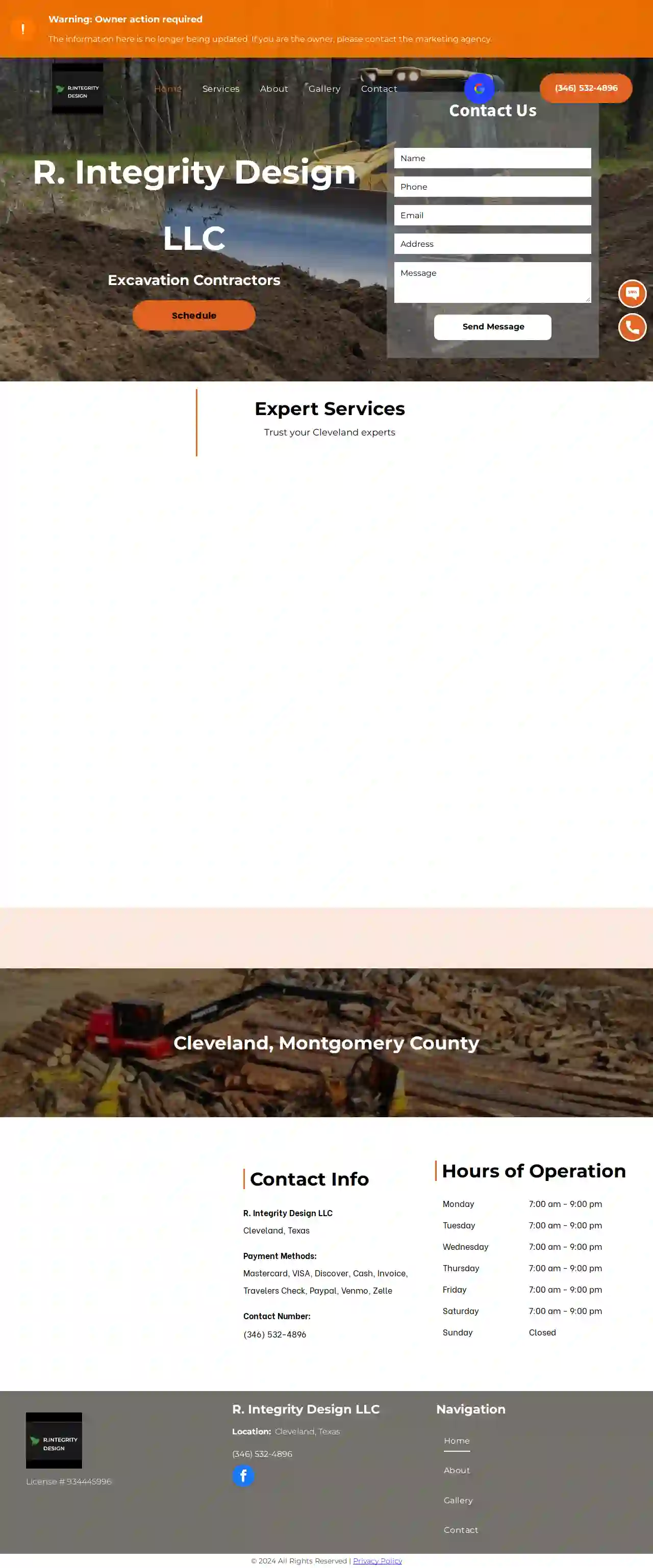
R. Integrity Design LLC
55 reviewsCleveland, Texas, USIntroducing R. Integrity Design LLC Are you looking for an experienced excavation contractor in Cleveland, TX? At R. Integrity Design LLC, our excavation services are rooted in a steadfast commitment to customer satisfaction. For over two decades, we have ensured that every project we undertake meets the highest standards of quality and safety. We understand the critical role that site preparation plays in any construction project, whether it's for a cozy home or a sprawling commercial complex. Our quick service doesn’t compromise on quality, and our reputation for great customer service is a testament to our client commitments. Our range of services is as diverse as our client base. From precise site clearing that paves the way for new beginnings to demolition services that carefully dismantle the old, we handle each task with unparalleled expertise. Our team excels in land demolition, clearing sites with efficiency and safety. We provide essential grading services like regrading and resloping to lay the ideal foundation for your construction. In construction demolition, we’re meticulous, ensuring precision in every phase. Our subgrade stabilization strengthens the base of your projects, and we’re adept at constructing retention walls, crucial for soil erosion and water flow control in civil constructions. Our work in specialized projects like railroad sighting, railroad yards, and railroad crossings showcases our versatility and ability to tackle complex tasks. We provide materials like gravel, crushed concrete, and limestone, integral to various construction phases. What sets R. Integrity Design LLC apart is our unwavering dedication to delivering exceptional service at great prices. We offer free estimates, ensuring transparency right from the start. For top-notch excavation services in Cleveland, TX, choose R. Integrity Design LLC. We're ready to bring your construction visions to life with our expertise. Reach out for a free estimate and discover why we're a go-to contractor in the industry. Together, let's create something outstanding.
- Services
- Why Us?
- Gallery
Get Quote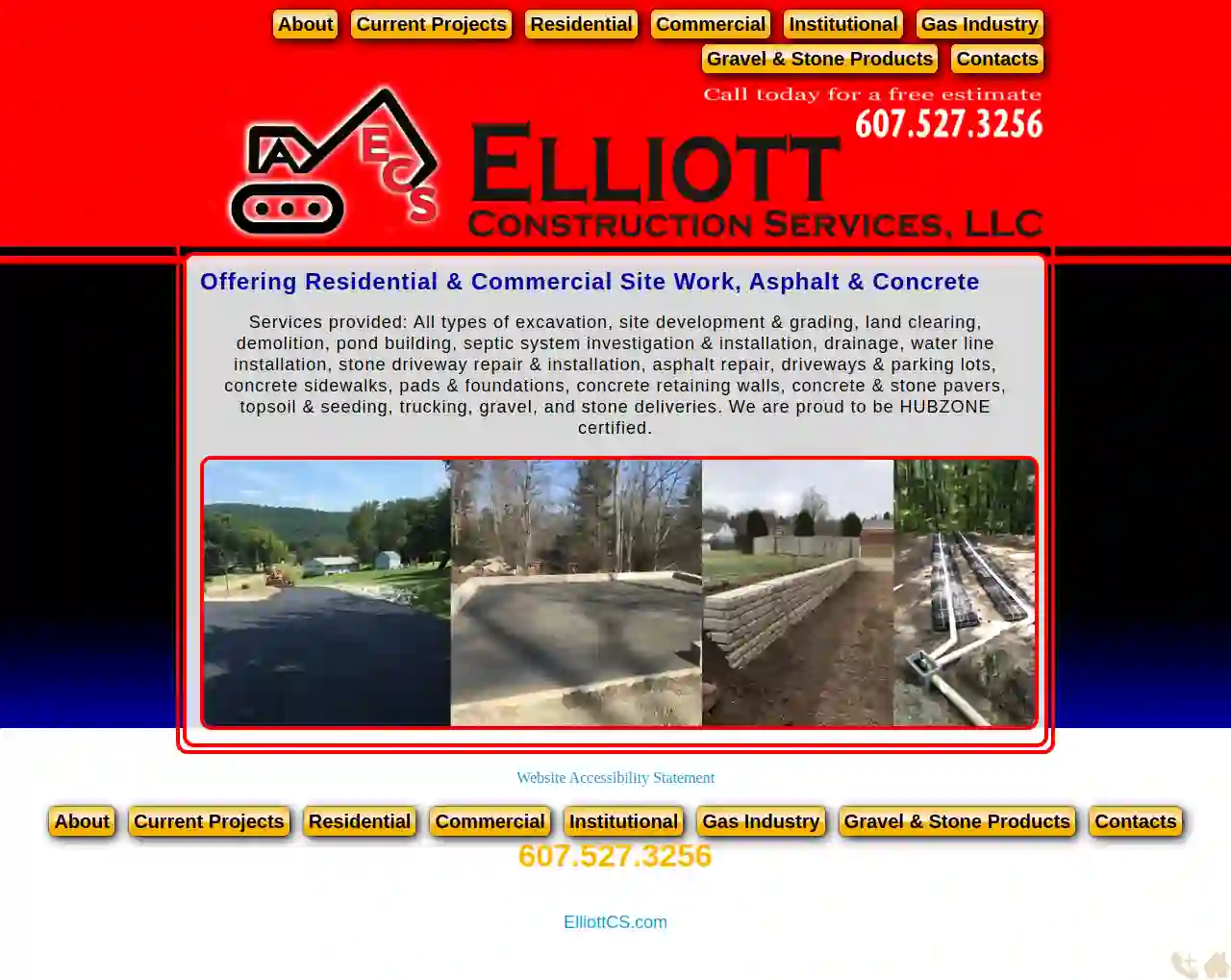
Austin Construction LLC
4.65 reviews5054 County Route 125, Campbell, 14821, USElliott Construction Services, LLC Elliott Construction Services, LLC is a HUBZONE certified company offering a wide range of services for residential, commercial, and institutional projects. We are located just minutes off of exit 41 on Interstate 86 in Campbell, NY, making us conveniently located for projects in the Southern Tier region of New York. Our team has extensive experience in all types of excavation, site development & grading, land clearing, demolition, pond building, septic system investigation & installation, drainage, water line installation, stone driveway repair & installation, asphalt repair, driveways & parking lots, concrete sidewalks, pads & foundations, concrete retaining walls, concrete & stone pavers, topsoil & seeding, trucking, gravel, and stone deliveries. We are committed to providing high-quality workmanship and exceptional customer service. Our team is dedicated to providing our clients with the highest quality services and exceeding their expectations. We are committed to safety, efficiency, and environmental responsibility in all our projects. We are proud to be HUBZONE certified, which allows us to provide competitive pricing and exceptional service to our clients.
- Services
- Why Us?
- Gallery
Get Quote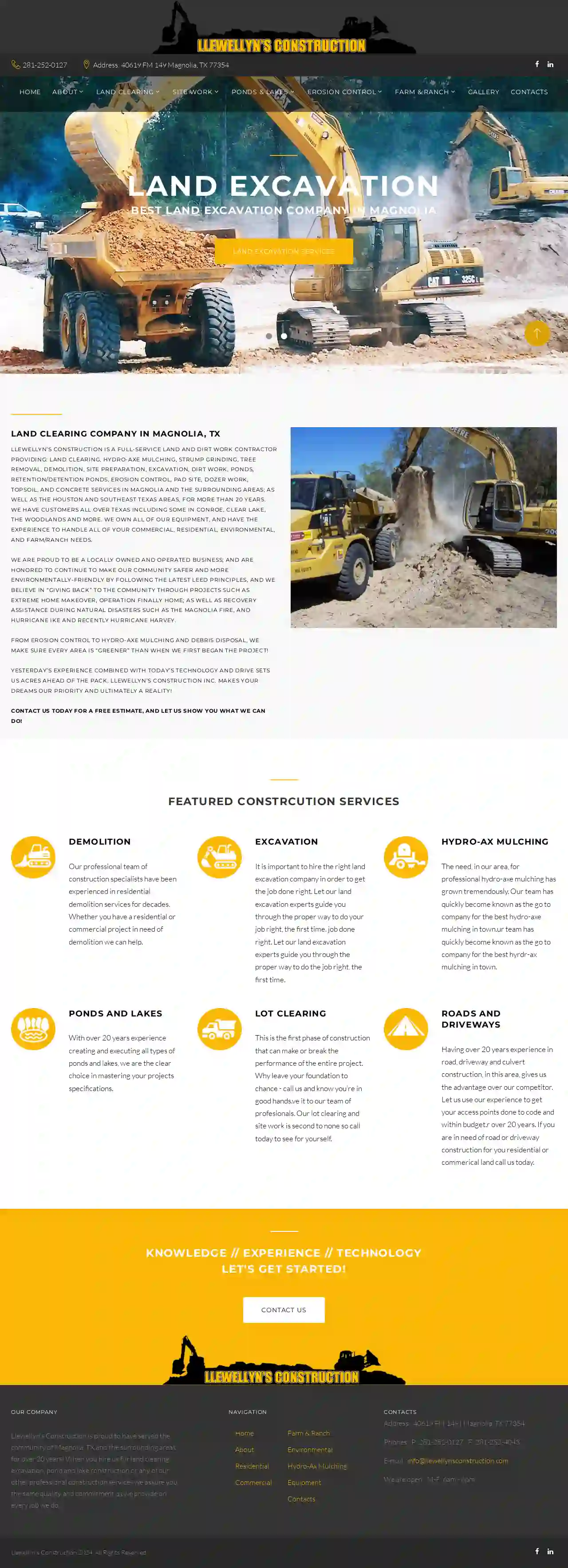
Llewellyn's Construction
4.25 reviews40619 FM 149, Magnolia, 77354, USLlewellyn's Construction: Your Trusted Partner for Land Clearing, Excavation, and More Founded in 1996 by John Llewellyn, Llewellyn's Construction has grown from a small "dozer" company to a trusted leader in all phases of earthwork for Montgomery, Harris, Walker, Waller, Grimes, and surrounding counties. We've built a reputation for quality, commitment, and exceeding customer expectations. We're proud to be a locally owned and operated business, committed to making our community safer and more environmentally friendly by following LEED principles. We also believe in giving back through projects like Extreme Home Makeover, Operation Finally Home, and disaster relief efforts. Our team of experts has the experience and technology to handle all your commercial, residential, environmental, and farm/ranch needs. We own all our equipment, ensuring we can deliver efficient and effective solutions for every project. From erosion control to hydro-axe mulching and debris disposal, we make sure every area is "greener" than when we first began the project! Llewellyn's Construction makes YOUR dreams our priority and ultimately a reality! Contact us today for a free estimate and let us show you what we can do!
- Services
- Why Us?
- Gallery
Get Quote
KO Excavation
1San Antonio, US- Services
- Why Us?
Get Quote
Texas Diggers
53 reviewsHouston, US- Services
- Why Us?
Get Quote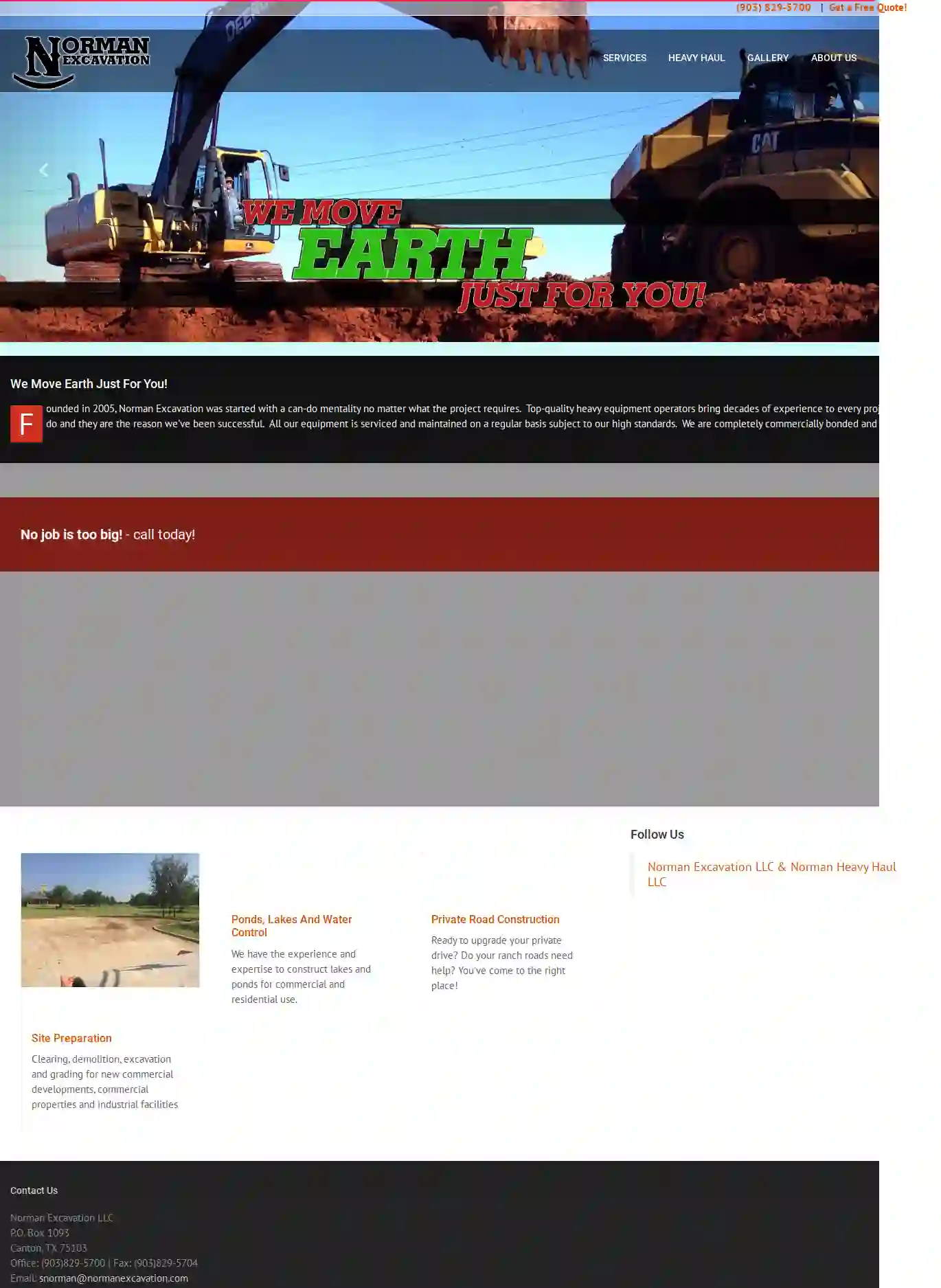
Norman Excavation & Trucking
4.52 reviews100 Norman Rd, Stratford, N0L 1T0, USNorman Excavation: Your Trusted Partner for Excavation Services Norman Excavation is a family-owned and operated business with over 20 years of experience in the excavation industry. We are committed to providing our clients with high-quality, reliable, and affordable excavation services. We have a team of experienced and skilled operators who are dedicated to getting the job done right, on time, and within budget. We offer a wide range of excavation services, including: Site preparation Foundation excavation Utility trenching Demolition Grading And more! We are committed to safety and environmental responsibility. We use the latest equipment and techniques to ensure that our projects are completed safely and efficiently. We are also committed to minimizing our environmental impact. We are proud to be a member of the community and we are committed to providing our clients with the best possible service. Contact us today for a free estimate.
- Services
- Why Us?
Get Quote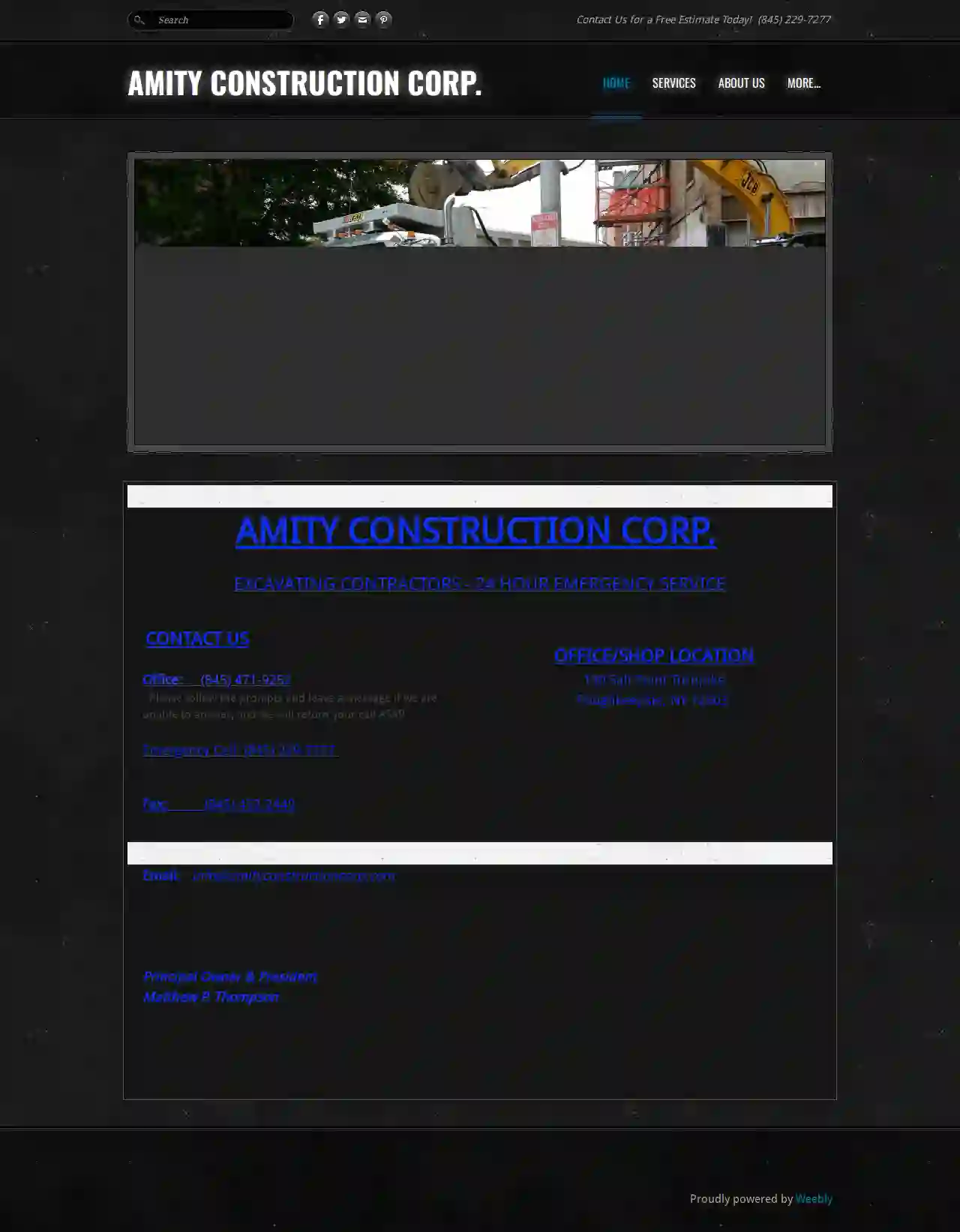
Amity Construction
48 reviews130 Salt Point Turnpike, Poughkeepsie, 12603, USAbout Amity Construction Corp. Amity Construction Corp. has been serving the Hudson Valley since 2005. Our office is located in Poughkeepsie, NY, and we serve both residential and commercial customers in the surrounding area. Amity Construction Corp is a community-oriented, Equal Opportunity Employer. Our Experience We have a proven track record of success, having completed numerous projects for a wide range of clients, including: Village of New Paltz (2023): Consent Order Compliance, Sewer Upgrades, Sewer Remediations Packenkill Union Free School District (2023): Site Construction for Hagan & Nassau Elementary Schools, Site Construction for Orville Todd MS Town of Wawarsing (2022-2023): Local Roads, Residential Water Services NYS OGS (2022-2023): Storm Drain Improvements, Rockland PC Hudson River Campus, Poughkeepsie, NY Wappingers Central School District (2022): Site Wide Renovations Dutchess BOCES (2021-2023): Site Work Salt Point, Additions and Alterations Village of Ellenville (December 2020): Water Main, Village Hydrant & Valve Replacement Town of Carmel (November 2020): Water & Irrigation System Village of New Paltz (September 2020): Sewer Remediation National Park Service - FDR - Red House Water Line (November 2019) HVRA - DCC Airport Building - Water Line Construction Eastdale Village - NYSDOT Site Work (November 2019) HVRA - ARFF/ SRE Building - Water Line Construction HVRA - AAG Water Connection (August 2019) Dutchess County Jail (Temporary Service for JTC project) NYS OPRHP – Taconic Region – Bash Bish Cabins (Waste Water System Replacement) North Salem Central School District - PQ Septic (August 2018) Wappingers Central School District - John Jay HS (July 2018): Sewage & Water Main Upgrades Hudson Valley Federal Credit Union - Route 9, South Road, Poughkeepsie, NY (January 2018): Site work for New Branch South Drive Bridge Repairs, Hyde Park, NY (August 2017) Hudson Valley Federal Credit Union - Route 9, Hyde Park, NY (September 2017): Site work for Drive-Thru Renovations Hudson Valley Federal Credit Union - Route 55, Lagrange, NY (November 2016): Site-work for New Branch Hudson Valley Federal Credit Union - Route 9, Fishkill (October 2015): Site-work for New Branch Victory Lake Nursing Home (Hyde Park, NY) The Townhomes at Inwood Lake (Poughkeepsie, NY) Roosevelt Fire District (Hyde Park, NY) Frantoni Villas (Hyde Park, NY) Hyde Park Nursery School (Hyde Park, NY)
- Services
- Why Us?
- Our Team
- Gallery
Get Quote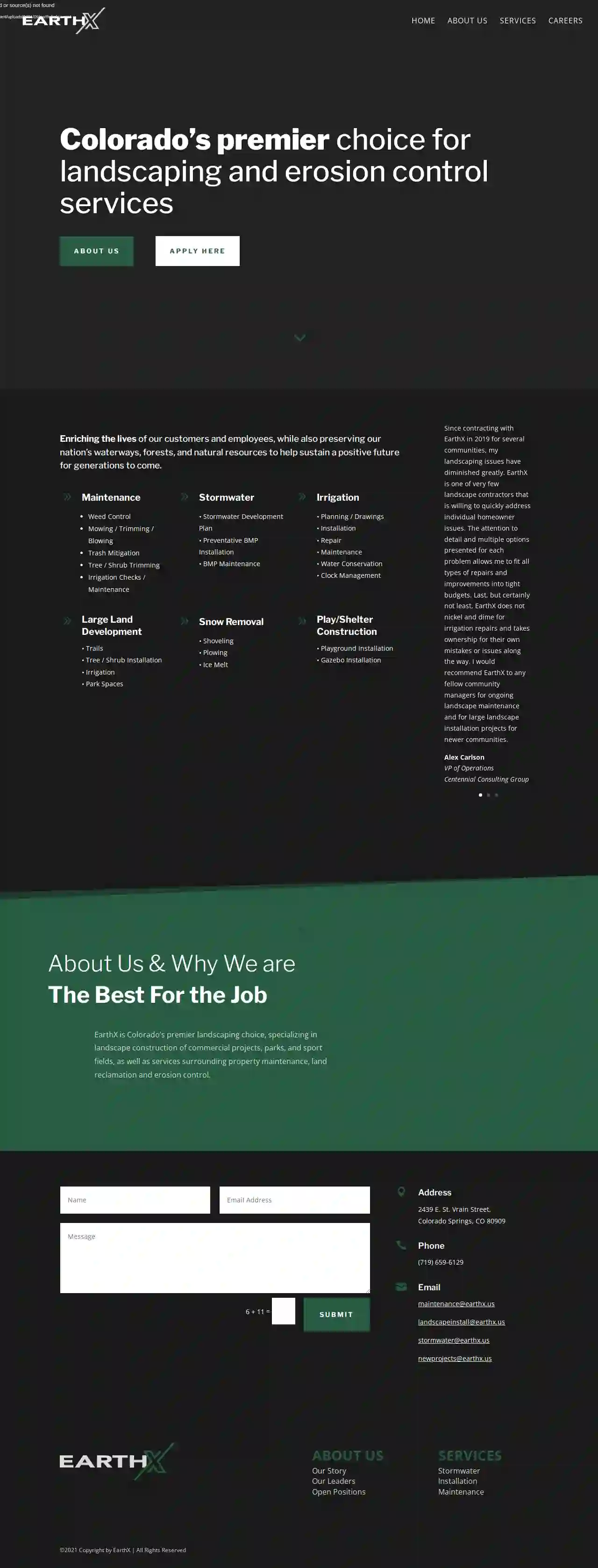
EarthX
4.312 reviews2439 E. St. Vrain Street, Colorado Springs, 80909, USAbout Us & Why We are The Best For the Job EarthX is Colorado’s premier landscaping choice, specializing in landscape construction of commercial projects, parks, and sport fields, as well as services surrounding property maintenance, land reclamation and erosion control. Our Story Enriching the lives of our customers and employees, while also preserving our nation’s waterways, forests, and natural resources to help sustain a positive future for generations to come. Our Leaders Since contracting with EarthX in 2019 for several communities, my landscaping issues have diminished greatly. EarthX is one of very few landscape contractors that is willing to quickly address individual homeowner issues. The attention to detail and multiple options presented for each problem allows me to fit all types of repairs and improvements into tight budgets. Last, but certainly not least, EarthX does not nickel and dime for irrigation repairs and takes ownership for their own mistakes or issues along the way. I would recommend EarthX to any fellow community managers for ongoing landscape maintenance and for large landscape installation projects for newer communities. Alex Carlson VP of Operations Centennial Consulting Group As a real estate developer, we oversee many commercial and residential properties throughout the Colorado front range. We have used EarthX for many years for everything from building fences and installing parks to installing and maintaining landscapes. Their excellent work has been instrumental in improving the appearance and function of every property. They are easy to work with, consistent, and good at what they do. Their costs are very fair. You always know when you hire EarthX that the job will be done in a timely manner and be done right. They are also very responsive and address any issue that comes up in a timely manner. Thanks, EarthX! Chasity McMorrow Colorado Springs I’ve been using EarthX for several years now. I always feel like a priority, regardless of the scale of the work I am requesting. They are easy to get a hold of and have been very responsive. The quality of work is top-notch and is always reasonably priced. The team at EarthX came out to my house and gave me a free estimate and consultation for a recent project. The work was scheduled and completed just a week later. The new grass looks great, and my irrigation system runs more efficiently than ever. I’ve recommended EarthX to all my family and friends. Ben PetersonColorado Springs
- Services
- Why Us?
- Testimonials
- Gallery
Get Quote
Ten Point Turf and Excavation LLC
57 reviewsPlano, USWelcome to Ten Point Turf & Excavation LLC, where we sculpt dreams into reality and ground into artistry. Over 15 years of experience with land leveling and other services. Our artificial turf installation and excavation service is more than just dirt and grass; it's the foundation of your vision. From precision excavation to lush, green landscapes, we dig deep to bring your projects to life! At Ten Point Turf & Excavation LLC, our mission is to provide high-quality artificial turf installation and excavation services to our customers, offering innovative solutions that enhance outdoor spaces and exceed expectations. With a commitment to professionalism, reliability, and customer satisfaction, we aim to transform landscapes with eco-friendly and sustainable practices, delivering long-lasting and aesthetically pleasing results.
- Services
- Why Us?
- Gallery
Get Quote
Over 3,943+ Excavation Contractors on our directory
Our excavation providers operate in Killeen and surroundings!
ExcavationHQ has curated and vetted the Best Excavation Contractors in and around Killeen. Find a reliable business today.
Frequently Asked Questions About Excavation Contractors
- Sloped Property: Your property has a significant slope, making it prone to soil erosion or landslides.
- Creating Usable Space: You want to level off a sloped area to create a flat surface for patios, gardens, or other outdoor spaces.
- Preventing Damage: Erosion is threatening existing structures, driveways, or walkways.
- Landscaping Features: You're incorporating tiered gardens, raised beds, or other landscaping elements requiring soil retention.
- Topsoil Removal: Stripping the fertile topsoil layer from a site, often preserving it for landscaping.
- Trench Excavation: Digging long, narrow trenches for utilities (pipes, cables) or foundations.
- Basement Excavation: Removing earth to create a space for a basement beneath a structure.
- Pool Excavation: Digging a precise hole for installing a swimming pool.
- Roadway Excavation: Removing earth and preparing the ground for road construction.
- Demolition Excavation: Clearing debris and preparing the site after demolition.
- Channel Excavation: Creating channels for drainage or irrigation.
- Project Size and Scope: The larger and more complex the excavation, the higher the cost.
- Soil Type: Different soil types require different equipment and techniques, impacting costs. Rocky or clay-rich soil can be more expensive to excavate than loose soil.
- Accessibility: Difficult-to-access sites might require specialized equipment or additional labor, increasing expenses.
- Disposal Costs: Hauling away excavated material (soil, rocks, etc.) to disposal sites incurs additional fees.
- Permits and Inspections: Depending on local regulations, permits and inspections might be required, adding to the overall cost.
- Project Type and Size: Ensure the contractor has experience handling projects similar to yours in scale and complexity.
- Reputation and Reviews: Check online reviews and testimonials, and request references from previous clients.
- Licensing and Insurance: Verify that the contractor is properly licensed and insured to protect you from liability.
- Equipment and Resources: Confirm that they have the necessary equipment and resources for your project's needs.
- Communication and Transparency: Choose a contractor who communicates clearly, provides detailed estimates, and keeps you informed throughout the project.
- Safety Record: Inquire about their safety protocols and track record to ensure a safe work environment.
- Price: While price is important, it shouldn't be the only deciding factor. Balance affordability with experience, reputation, and quality of service.
How do I know if I need a retaining wall?
What are the different types of excavation?
How much does excavation cost?
How do I choose the right excavation contractor for my project?
How do I know if I need a retaining wall?
- Sloped Property: Your property has a significant slope, making it prone to soil erosion or landslides.
- Creating Usable Space: You want to level off a sloped area to create a flat surface for patios, gardens, or other outdoor spaces.
- Preventing Damage: Erosion is threatening existing structures, driveways, or walkways.
- Landscaping Features: You're incorporating tiered gardens, raised beds, or other landscaping elements requiring soil retention.
What are the different types of excavation?
- Topsoil Removal: Stripping the fertile topsoil layer from a site, often preserving it for landscaping.
- Trench Excavation: Digging long, narrow trenches for utilities (pipes, cables) or foundations.
- Basement Excavation: Removing earth to create a space for a basement beneath a structure.
- Pool Excavation: Digging a precise hole for installing a swimming pool.
- Roadway Excavation: Removing earth and preparing the ground for road construction.
- Demolition Excavation: Clearing debris and preparing the site after demolition.
- Channel Excavation: Creating channels for drainage or irrigation.
How much does excavation cost?
- Project Size and Scope: The larger and more complex the excavation, the higher the cost.
- Soil Type: Different soil types require different equipment and techniques, impacting costs. Rocky or clay-rich soil can be more expensive to excavate than loose soil.
- Accessibility: Difficult-to-access sites might require specialized equipment or additional labor, increasing expenses.
- Disposal Costs: Hauling away excavated material (soil, rocks, etc.) to disposal sites incurs additional fees.
- Permits and Inspections: Depending on local regulations, permits and inspections might be required, adding to the overall cost.
How do I choose the right excavation contractor for my project?
- Project Type and Size: Ensure the contractor has experience handling projects similar to yours in scale and complexity.
- Reputation and Reviews: Check online reviews and testimonials, and request references from previous clients.
- Licensing and Insurance: Verify that the contractor is properly licensed and insured to protect you from liability.
- Equipment and Resources: Confirm that they have the necessary equipment and resources for your project's needs.
- Communication and Transparency: Choose a contractor who communicates clearly, provides detailed estimates, and keeps you informed throughout the project.
- Safety Record: Inquire about their safety protocols and track record to ensure a safe work environment.
- Price: While price is important, it shouldn't be the only deciding factor. Balance affordability with experience, reputation, and quality of service.